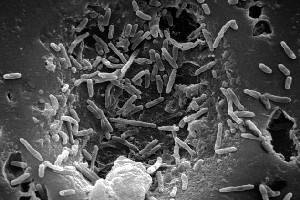Research performed at Northwest A&F University in China produced the first genetically modified (GM) cattle resistant to tuberculosis. The cattle produced were more difficult to infect and were largely protected against the actual symptoms of the disease. Myobacterium bovis is the bacteria responsible for bovine TB, which is a close relative to the bacteria that causes TB in humans. Bovine TB affects several species worldwide other than cattle and currently, the only methods of controlling the disease are culling or placing the animals on antibiotics, which can both be extremely costly and/or devastating. When one cow shows up positive for a TB test, usually the entire herd is culled to prevent possible other positives, and human transmission. In undeveloped regions, there is no effective control of the disease, and it can spread to humans via drinking an infected cow's unpasteurized milk.
The researchers deleted naturally occurring genes and inserted mouse gene SP110 into Holstein-Fresian cattle DNA using a technique called TALEN. In mice, SP110 helped protect them against TB transmission. 23 GM calves were produced. 13 calves lived into adulthood, and when their cells were studied, they showed higher resistance to M. bovis than cattle that were not genetically modified. The next step of the study was to introduce M. bovis into the lungs of 3 of the 13 GM cattle and 3 control (non-GM) cattle. Out of the GM cattle, 1 showed no signs of TB and the other 2 had reduced lesions on their major organs from the disease after necropsy several weeks later. Next, 9 of the 13 GM cattle and 9 control cattle were housed together with animals infected with TB. 6 out of the 9 GM cattle were not infected and the remaining 3 showed very minimal symptoms. All 9 of the control cattle contracted TB and had extensive lung damage.
While this study did not prove complete resistance, researchers say it is a goal to develop disease-resistant livestock.
GMO, antibiotics, culling... all of these things are huge in the animal welfare and nutrition world. While I personally do not have any issues eating GMO's, I am skeptical as to how this affects the future generations of cattle that have the SP110 gene. Just because the cattle are resistant to TB does not mean they are resistant to other diseases and infectious organisms either.
This is a HUGE step in the right direction, even if some find it morally displeasing. I think we need better methods at controlling transmission other than one gene for one disease at a time. There are still "mad cow disease", west nile virus, and other pathogens that can wipe out an entire herd. In my opinion, the bigger feat here is controlling transmission possibly via sanitation and appropriate farming methods. I applaud the scientists that were able to accomplish this study with goals they had expected, and hope that this helps in the future of zoonotic disease control.
Original Article: TALE nickase-mediated SP110 knockin endows cattle with increased resistance to tuberculosis

No comments:
Post a Comment